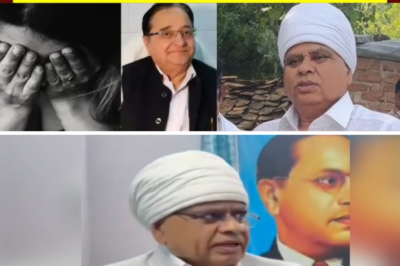The Modi government is once again in the spotlight, this time for its move to bring around 900,000 Waqf properties under its digital monitoring system. The launch of a new online portal has raised major concerns among India’s Muslim community, with many fearing that this is yet another attempt by the BJP to seize assets belonging to Muslims across the country.
What Is the Issue?
The government’s new digital portal aims to catalog and verify the ownership documents of Waqf properties—land and assets that have been donated by individuals for religious or charitable purposes within the Muslim community. The BJP’s intentions have come under scrutiny, as critics argue that the move is a calculated effort to take control of these properties, which are second only to Indian Railways in terms of land holdings in India.

Why the Controversy?
The core of the controversy lies in the government’s insistence that only those Waqf properties with complete documentation will be recognized on the portal. Properties lacking paperwork will not be registered, making it easier for the government to declare them as unclaimed or government land. Critics argue that this could lead to mass dispossession, especially since many of these properties are centuries old and may not have modern documentation.
Skeptics see this as a repeat of past policies, such as the controversial farm laws, which were also promoted as beneficial but faced massive public backlash. Many allege that the government is targeting the Muslim community through selective legislation, whether it’s “love jihad,” anti-conversion laws, or now the Waqf property portal.
Is the Move Premature?
A key question being raised is why the government is pushing ahead with the portal when the matter is still pending before the Supreme Court. Some suspect that the government is confident the verdict will be in its favor, raising concerns about the independence of the judiciary and the future of India’s democracy.
Legal experts and the All India Muslim Personal Law Board have criticized the government for disrespecting the Supreme Court’s authority by moving forward with the portal before a final verdict is announced.
Potential Impact
If implemented, the new system would empower local magistrates to decide the status of disputed properties. Critics fear that this could lead to arbitrary decisions, with little recourse for those who lose their property. There is also concern that the government’s approach could set a precedent for seizing other community assets, especially those belonging to minorities and the poor.
Past incidents, such as the demolition of homes in Delhi’s poorer neighborhoods, have only heightened fears that the government is systematically targeting vulnerable groups.
Constitutional Concerns
Article 26 of the Indian Constitution guarantees religious communities the right to manage their own affairs in matters of religion and property. Many see the government’s move as a violation of this fundamental right, arguing that it singles out Muslims for special scrutiny and control.
Conclusion
The digital portal for Waqf properties has sparked a fierce debate about property rights, minority protections, and the true intentions of the Modi government. While the government claims the portal is about transparency and good governance, critics see it as part of a broader pattern of targeting Muslims and undermining constitutional guarantees.
As the Supreme Court prepares to rule on the issue, the nation watches closely. The outcome will not only impact millions of Muslims but could also set the tone for how minority rights are protected—or eroded—in the world’s largest democracy.
News
रेप पर गैर-जिम्मेदार बयान और राजनीति की गिरती संवेदनशीलता: सवाल नेताओं की सोच पर
रेप पर गैर-जिम्मेदार बयान और राजनीति की गिरती संवेदनशीलता: सवाल नेताओं की सोच पर भारत में यौन हिंसा जैसे गंभीर…
महिलाओं पर शर्मनाक बयान, विपक्ष की Dirty Politics बेनकाब | Phool Singh Baraiya | ST Hassan | N18V
रेप पर गैर-जिम्मेदार बयान और राजनीति की गिरती संवेदनशीलता: सवाल नेताओं की सोच पर भारत में यौन हिंसा जैसे गंभीर…
रामायण Film के बायकाट की तैयारी, घुटनों पर आए AR Rahman l Chandra Prakash l Anju Pankaj
ए.आर. रहमान के बयान पर बढ़ता विवाद: कला, पहचान और बदलता बॉलीवुड प्रसिद्ध संगीतकार ए. आर. रहमान द्वारा हाल ही…
भारत में A R Rahman जैसे एक नहीं अनेक हैं ! | Bollywood, Amitabh Bachchan | Global Harsh
ए. आर. रहमान का बयान: क्या वाकई बॉलीवुड में सांप्रदायिक भेदभाव है? हाल ही में मशहूर संगीतकार ए. आर. रहमान…
जब टूटना ही शुरुआत बन गया
जब टूटना ही शुरुआत बन गया कैलिफ़ोर्निया की सुबह हमेशा की तरह सुनहरी थी। सूरज की किरणें ऊँची इमारतों के…
अमेरिकन करोड़पति जो बिजनेस में बर्बाद हो चुका था लेकिन भारत बाते ही उसकी जिंदगी बदल गई थी 😱
जब टूटना ही शुरुआत बन गया कैलिफ़ोर्निया की सुबह हमेशा की तरह सुनहरी थी। सूरज की किरणें ऊँची इमारतों के…
End of content
No more pages to load










